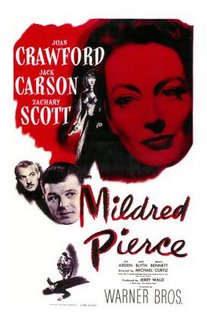Mildred Pierce
 "If there are more vicious quarrels in print than those in which these characters indulge their sadism I have not seen them. (...) That this is a novel that, once begun, will almost surely be read to the end is understandable, for it has in it the deep, slow pull of the ancient ooze where worms and serpents crawled; it reflects no codes, no restrictions, and none but the primordial necessities. It is a bath in sensation."
"If there are more vicious quarrels in print than those in which these characters indulge their sadism I have not seen them. (...) That this is a novel that, once begun, will almost surely be read to the end is understandable, for it has in it the deep, slow pull of the ancient ooze where worms and serpents crawled; it reflects no codes, no restrictions, and none but the primordial necessities. It is a bath in sensation."
This is from a contemporary review of James Cain's novel Mildred Pierce. More reviews here.
I haven't read the book (it's not on the top of my list either) but saw the movie for the first time yesterday. Like all film-noirs of the time (on surface it is more of a melodrama, though of a very "un-family movie" type), it makes me wonder how did Hollywood lose all its viciousness? How did it become so tame?
3 comments:
Now we have physical violence instead of the psychological, explosions instead of suspense, crash-test-dummies instead of characters, cliches instead of dialog. When you had individuals you had the unpredictable, you had uncertain motivations, you had the complexity and danger of real life, and you could have a movie where you could not predict every line and every scene an hour in advance. Hollywood today is like a Lego kit of interchangeable parts, where the least interesting is the most highly praised, and the obvious is deemed a revelation. The best actress is the one who acts the least but changes her outfits and hair the most. The best actor is the one most likely to be named the sexiest man alive. The best movie is the most boring, and the best director is whoever's turn it is next.
Of course they are only engaged in churning out the hits. It's an "industry" after all.
Tom, you have summarised it so well. I could never have done it. Thank you!
Just another area where vulgar commerce has triumphed over art. It is obvious in every aspect of the culture. Everything is an "industry" now.
Tom, you summed it very well.
Last night, I watched the fabulous opening sequence of Altman's The Player, and your comment rings very true.
Post a Comment